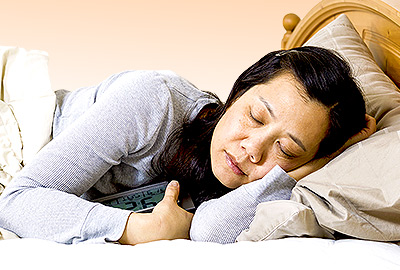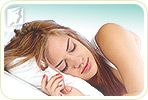Anyone who has ever suffered from sleep disorders knows the far-reaching consequences they can have on virtually every aspect of life. Consequently, finding the right sleep problems treatment is of the utmost urgency. Luckily, with plentiful options, relief is just a step away.
Keep on reading to find out how to treat sleep disorders to finally give your body the restorative slumber it needs to stay strong and healthy!
Three Approaches to Treating Sleep Problems
Women can consider three approaches to treating sleep problems: (1) Lifestyle changes, (2) Alternative medicine, and (3) Conventional medicine. They are encouraged to start with the most natural options and explore other, more advanced options only when needed.
Lifestyle Changes for Sleep Disorders Treatment

The first-level of sleep problems treatment involves making healthier lifestyle adjustments, which can bring tremendous benefits for women's sleep and overall health. While it carries no risks, it demands the strongest willpower.
Nutritious Diet
The first stop on the path to healthier sleep is a woman's diet. Creating a vicious cycle, unhealthy eating habits can negatively affect sleep, which, in turn, makes them more likely to eat poorly. A well-balanced menopausal diet contains ample supplies of wholesome foods, such as vegetables and fruits, that are rich in the following nutrients:
- Slow-release carbohydrates that are rich in fiber and do not cause sudden spikes of blood sugar should be chosen instead of refined sugars (white bread or white rice) as they make women less likely to suffer from insomnia.1
Quinoa, amaranth, millet, buckwheat
- Lean protein, preferably plant-based, eaten in adequate amounts can benefit sleep problems treatment as both low and high protein intake were linked to poor sleep quality and difficulty maintaining sleep, respectively.2
Chicken, fish, eggs, beans
- Healthy fats - that is, mono- and polyunsaturated fats -are recommended over saturated fats as high saturated fats and low fiber intake has been associated with poorer, less restorative sleep.3
Olive oil, avocado, nuts, sachainchi
- Phytoestrogens, especially isoflavones, are plant-based compounds with weak estrogenic actions that have been scientifically shown to improve sleep duration and quality.4
Soy, oats, chickpeas, mung beans
Also, it is recommended to avoid drinking caffeine and other stimulants in the evening as they could prolong a state of arousal and make falling asleep much more difficult.
Regular Exercise
Benefits of exercise for the body and mind are quite extensive and also extend to sleep. Studies have shown that regular exercise helps regulate sleep patterns by making women fall asleep faster and sleep better.5 It can also help women control menopausal weight gain since poor sleep is commonly associated with obesity.6
Amount: Women are encouraged to engage in at least 30 minutes of moderate aerobic workouts a day, five times a week, or 75 minutes of vigorous exercise weekly.7
Type: To optimize their sleep disorder treatment plan, women should combine cardio workouts - brisk walking or swimming - with strength training exercises, like squats or yoga.
Useful tips: Research is not clear on what time of the day is best for sleep promotion. As such, women should experiment with exercising at various times to see which one best fits their needs.
Precautions: Because vigorous intensity exercise close to bedtime might actually worsen sleep problems as well as put women with osteoporosis at risk of fractures, they are best to be avoided.
Wholesome Habits
With a healthy diet and regular physical activity, women will be on the right tract to treating sleep problems. Optimizing one's daily lifestyle practices can make their efforts even more effective and long-lasting. As an added benefit, they will also help improve women's physical and emotional health.
Relieving stress naturally is key for sleep disorders treatment as stress is one of the most common causes of poor sleep.8 There is also evidence that meditation improves insomnia and other menopausal symptoms.9
Practicing good sleep hygiene by keeping up with a consistent sleep schedule, cutting down on screen time before bed, and creating a sleep-inducive bedroom environment can make it easier to fall and stay asleep.
Taking advantage of homemade remedies can help treat sleep problems naturally. Good options include herbal infusions or aromatherapy with sleep- and relaxation-promoting herbs, like lavender, valerian, or chamomile.
Quitting addictions to smoking and excess alcohol drinking is a must in order to treat sleep disorders. Nicotine and alcohol have been found to suppress rapid eye movement (REM) sleep, making sleep less restorative.10,11
Alternative Medicine for Sleep Disorders Treatment

The second-level approaches to treating sleep problems involve alternative medicine, most commonly herbal supplements. Their numerous benefits include being easy to use, causing no side effects, and addressing the underlying cause of sleep disorders in menopausal women, hormonal imbalance.
There are two types of herbal supplements from which women can choose to treat sleep problems: phytoestrogenic and hormone-regulating supplements.
Phytoestrogenic Supplements
Phytoestrogenic supplements, like black cohosh, contain compounds, called phytoestrogens, that exert weak estrogenic effects in the body. By balancing estrogen levels, they help balance other reproductive hormones, like progesterone, to alleviate symptoms, including sleep disorders. To avoid dependency and worsening of hormonal imbalance, phytoestrogenic supplements are recommended to be used short-term.
Hormone-Regulating Herbal Supplements
Hormone-regulating supplements, like Macafem, work by providing the body with beneficial alkaloids instead of outside hormones. They gently nourish the hormonal glands and stimulate their own hormone production, thus alleviating sleep problems. As such, these supplements are considered one of the safest and most effective options for relieving poor sleep and other menopause symptoms long-term.
From Nature and Health Magazine, Dr. Chacon says:
"Macafem's nutrients help restore natural hormones in women. Unlike hormone drugs, which are basically resumed in taking synthetic hormones, Macafem acts totally different in your body. It nourishes and stimulates your own natural hormone production by inducing the optimal functioning of the pituitary and endocrine glands." Click on the following link to learn more about Macafem.
Combining lifestyle changes and herbal supplements is oftentimes a sufficient way to treat sleep problems safely and naturally. However, for women with severe symptoms, medications or psychotherapy can be more appropriate.
Conventional Medicine for Sleep Disorders Treatment

The third-level approaches to treating sleep problems -medications and psychotherapy - may involve the highest costs and risks of side effects. Nevertheless, they are a vital treatment option to consider for severe or chronic sleep problems.
Medications
The choice of medications for sleeping problems will depend on their type, cause, and severity of symptoms. Because of potentially serious side effects they may cause, their use is evaluated on an individual basis and usually short-term.
Medications for sleeping problems generally work by either helping women fall asleep or staying asleep, including:
Over-the-counter antihistamines - such as diphenhydramine -may be used occasionally as sleeping pills due to their sedating actions.
Melatonin receptor agonists - like ramelteon - may be used to treat sleep-onset insomnia to help women fall asleep more easily.
Sedative-hypnotics - a class of drugs that include benzodiazepines, like quazepam or estazolam, and non-benzodiazepines, such as zaleplon or zolpidem - can be used for short-term treatment of insomnia.
Antidepressants, including trazodone or mirtazapine,may be prescribed off-label to treat sleep problems, especially when they are due to anxiety or depression.
Hormone replacement therapy (HRT) contains estrogen, progesterone, or their combination for sleep problems treatment. Although it was once an effective and popular treatment option, HRT is now only reserved for severe symptoms of menopause as it has been found to increase the risk of serious side effects and put women's health at risk, as shown in the studies below.
Psychotherapy
One of the most beneficial types of psychotherapy for sleep problems, especially for insomnia, is cognitive behavioral therapy (CBT). As the name suggests, it has two components:
The cognitive component, which consists of re-constructing thoughts that might be causing sleep problems
The behavioral component, which involves changing habits that might contribute to poor sleep. This can be achieved through a variety of techniques, such as sleep restriction therapy (SRT) or biofeedback, among others.
The above approaches can be applied in any combination to treat sleep problems, according to individual needs. However, more and more women manage to safely relieve their symptoms with lifestyle changes and herbal supplements without ever having to rely on pharmacological options.
A Safe Way of Treating Sleep Problems
Implementing Lifestyle Changes:
- Eating balanced meals with complex carbs, healthy fats, and protein
- Keeping up with at least 150 minutes of moderate exercise weekly
- Relieving stress with breathing techniques and meditation
- Practicing good sleep hygiene and quitting addictions
And Taking Herbal Supplements:
- Phytoestrogenic herbal supplements, like black cohosh
- Or natural hormone-regulating supplements, like Macafem
Sources
- American Society for Nutrition. (2012). Is Obesity Linked to Sleep Deprivation?Retrieved May 4, 2020 from https://nutrition.org/obesity-linked-sleep-deprivation/
- Cleveland Clinic. (2014). Lifestyle and behavioral Treatments for Sleep Disorders. Retrieved May 4, 2020 from https://my.clevelandclinic.org/health/treatments/12143-lifestyle-and-behavioral-treatments-for-sleep-disorders
- Mayo Clinic. (2016). Insomnia treatment: Cognitive behavioral therapy instead of sleeping pills. Retrieved May 4, 2020 fromhttps://www.mayoclinic.org/diseases-conditions/insomnia/in-depth/insomnia-treatment/art-20046677
- Medline Plus. (n.d.). Sleep Disorders. Retrieved May 4, 2020 from https://medlineplus.gov/sleepdisorders.html
- Nature and Science of Sleep. (2013). Association between sleep disorders, obesity, and exercise: a review.Retrieved May 4, 2020 from https://www.ncbi.nlm.nih.gov/pmc/articles/PMC3630986/
- National Sleep Education. (2017). Healthy Sleep Habits. Retrieved May 4, 2020 from http://sleepeducation.org/essentials-in-sleep/healthy-sleep-habits
- National Sleep Foundation. (n.d.). The Best Exercises for Sleep.Retrieved May 4, 2020 from https://www.sleepfoundation.org/articles/best-exercises-sleep
Footnotes:
- The American Journal of Clinical Nutrition. (2020). High glycemic index and glycemic load diets as risk factors for insomnia: analyses from the Women's Health Initiative. Retrieved May 4, 2020 from https://academic.oup.com/ajcn/article-abstract/111/2/429/5673520?redirectedFrom=fulltext
- Advances in Nutrition. (2016). Effects of Diet on Sleep Quality. Retrieved May4, 2020 from https://www.ncbi.nlm.nih.gov/pmc/articles/PMC5015038/
- Journal of Clinical Sleep Medicine. (2016). Fiber and Saturated Fat Are Associated with Sleep Arousals and Slow Wave Sleep. Retrieved May 4, 2020 from https://www.ncbi.nlm.nih.gov/pubmed/26156950
- Nutrition Journal. (2015). Relationship between daily isoflavone intake and sleep in Japanese adults: a cross-sectional study. Retrieved May 4, 2020 from https://www.ncbi.nlm.nih.gov/pmc/articles/PMC4696198/
- John Hopkins Medicine. (n.d.) Exercising for Better Sleep. Retrieved May4, 2020 from https://www.hopkinsmedicine.org/health/wellness-and-prevention/exercising-for-better-sleep
- Nature and Science of Sleep. (2013). Association between sleep disorders, obesity, and exercise: a review. Retrieved May 4, 2020 from https://www.ncbi.nlm.nih.gov/pmc/articles/PMC3630986/
- American Heart Association. (2018). Recommendations for Physical Activity in Adults and Kids. Retrieved May4, 2020 from https://www.heart.org/en/healthy-living/fitness/fitness-basics/aha-recs-for-physical-activity-in-adults
- National Sleep Foundation. (n.d.). Stress and Insomnia. Retrieved May4, 2020 from https://www.sleepfoundation.org/articles/stress-and-insomnia
- Advances in Integrative Medicine. (2020). Meditation as an approach to lessen menopausal symptoms and insomnia in working women undergoing the menopausal transition period: A randomized controlled trial. Retrieved October 6, 2020 from https://www.sciencedirect.com/science/article/abs/pii/S2212958820301567
- National Sleep Medicine Reviews. (2009). Effects of nicotine on sleep during consumption, withdrawal and replacement therapy. Retrieved May4, 2020 from https://www.ncbi.nlm.nih.gov/pubmed/19345124
- National Sleep Foundation. (n.d.). How Alcohol Affects the Quality - and quantity - of sleep. Retrieved May4, 2020 from https://www.sleepfoundation.org/articles/how-alcohol-affects-quality-and-quantity-sleep
- JAMA. (2002). Risks and benefits of estrogen plus progestin in healthy postmenopausal women: principal results from the Women's Health Initiative randomized controlled trial. RetrievedMay4, 2020 from https://www.ncbi.nlm.nih.gov/pubmed/12117397
- The Lancet. (2019). Type and timing of menopausal hormone therapy and breast cancer risk: individual participant meta-analysis of the worldwide epidemiological evidence. Retrieved May 4, 2020 from https://www.thelancet.com/journals/lancet/article/PIIS0140-6736(19)31709-X/fulltext



